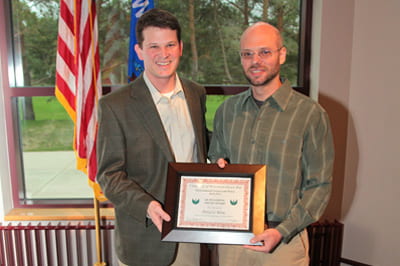 Philip G. Hahn, a 2010 graduate of the UW-Green Bay master’s program in Environmental Science and Policy, was honored April 30 at the annual alumni awards program.
Philip G. Hahn, a 2010 graduate of the UW-Green Bay master’s program in Environmental Science and Policy, was honored April 30 at the annual alumni awards program.
Hahn, now a Ph.D. student in the zoology program at UW-Madison, posed (above, right) with faculty adviser Mathew Dornbush of Natural and Applied Sciences after receiving the Outstanding Master’s Thesis Award.
 As a master’s degree student, Hahn was focusing his ecology research on an invasive woodland plant, garlic mustard, until something else caught his eye.
As a master’s degree student, Hahn was focusing his ecology research on an invasive woodland plant, garlic mustard, until something else caught his eye.
From there, he followed the slime trails. They led to slugs.
“A lot of people don’t study slugs, for obvious reasons,” Hahn told the awards banquet audience, “but I think they’re actually kind of fun.”
When the chuckles subsided, the student researcher explained why his research paper is getting serious attention in the scientific community. It was published in a peer-reviewed professional journal, Restoration Ecology, before he had even defended his master’s thesis.
Garlic mustard has swept through Wisconsin woodlands, especially in normally rich and diverse river bottom ecosystems. It forms thick stands in the forest understory but has virtually no value for wildlife and very little value to humans (although some find it palatable as a cooking herb).
The conventional thinking was that garlic mustard grows quickly and “out-competes” native plants, but Hahn’s research makes a subtle distinction.
When he began to study areas where garlic mustard was gaining a toehold, he also found the slugs. And not just any slugs. They were a previously overlooked, non-native species, deroceras reticulatum (the gray garden slug).
The problem, he observed, was that the exotic slugs were decimating native plants and opening a niche for invasives. When no herbivores — not even the voracious slugs — would touch the aromatic garlic mustard, the browsers moved on to adjacent areas. Grazing heavily, the slugs and other creatures cleared fresh ground for the spread of still more garlic mustard.
Hahn proposes that ecologists should re-think the way they restore areas previously infested by garlic mustard.
“It’s important to plant herbivore-resistant native species,” he says. Do that, and next-generation native plants should hold their own against the invasives.
Hahn credits his UW-Green Bay experience — especially access to a diverse, interdisciplinary roster of faculty members working in a rich range of specialty areas — for landing a plum lab position in the Madison zoology program.
“I think it’s cool that I can be the first one to ask a particular question,” he says of science in general, and science at UW-Green Bay in particular. “The only thing better is that you can also be the first one to answer that question.”

